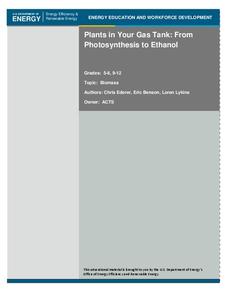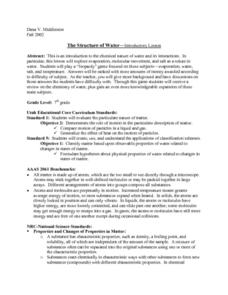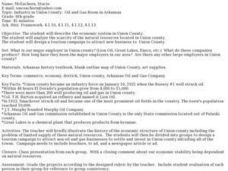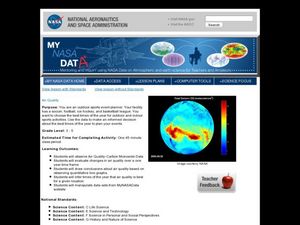Curated OER
Modeling an Oil Reserve
Students conduct an experiment. In this oil and natural gas lesson, students learn how geoscientists identify and explore reserves of petroleum. Students make a model of an oil reserve, record how much it would cost to drill for oil...
Curated OER
Renewable vs. Non-Renewable Resources
Fifth graders identify renewable vs. non-renewable resources and comprehend why conservation of resources is important. They are asked what they think the words natural and resource mean. Pupils then put the words together to define...
Curated OER
Getting the Oil Out
Young scholars discover ways of obtaining oil by participating in an experiment. In this natural resource activity, students identify diagrams of oil derricks and pumps in order to visualize how oil is retrieved from the earth. Young...
Santa Monica College
The Properties of Oxygen Gas
Scholars generate and collect pure oxygen through a decomposition reaction of hydrogen peroxide in the fourth lesson of an 11-part series. Then, they complete six investigations into the properties of oxygen.
Curated OER
Plants in Your Gas Tank: From Photosynthesis to Ethanol
Explore ethanol and how it is produced. Young scientists investigate photosynthesis and fermentation to the concept of conservation of energy and mass. They discuss the environmental and economical benefits of ethanol as a fuel additive.
Curated OER
Exhaust, Gas and Pollution
Students watch a demonstration of how bromthymol blue is used to indicate the presence of carbon dioxide in a gas. They design their own experiments to test gasses which are suspected of containing carbon dioxide.
Curated OER
Research Question - Greenhouse Gas Emissions
Learners review information from concept map to identify possible causes of greenhouse gas emissions, choose factor that they feel is largest contributor to greenhouse gas emissions in their town, and write research question on topic.
Curated OER
Waste Watchers
Students recognize the importance of saving energy to save natural resources. In this saving energy lesson, students complete a worksheet to find types of electricity meters in their homes. Students use meter readings to calculate energy...
Curated OER
The Chemical Nature of Water
Seventh graders simulate a Jeopardy game to examine the chemical nature of water. Among the topics featured are evaporation, water, salt, and temperature. finally, as review, 7th graders answer a battery of questions presented by the...
Curated OER
Fracking: Positive or Negative Impact?
Your teenagers may have heard of fracking, but do they really know what it is? And could they debate the benefits and risks? Educate your environmental science class with a lesson about hydraulic fracturing, non-renewable energy sources,...
National Energy Education Development Project
Great Energy Debate
If someone yelled for eight years and eight months, they could produce enough energy to heat one cup of coffee. A lesson on energy encourages scholars to research 10 different energy sources in groups before playing a game. Twenty...
Mathed Up!
Utility Bills
What is the total cost? Provided with seven problems, pupils determine the total cost for utilities. Scholars determine the amount of the utility used and determine the cost based upon the given unit rate. The resource is part of a prep...
College Board
2001 AP® Environmental Science Free-Response Questions
Water quality testing often reveals interesting facts about the local environment. Scholars respond to several AP® questions highlighting topics such as air pollution, water pollution, and the spread of disease. Each question requires a...
Bonneville
Informative Writing: Where Does Energy Come From?
Get energized about all the different sources of energy. A research project has scholars investigate a renewable or non-renewable energy type of their choice. They write a report on their findings and decide on a way to publish their work.
Curated OER
The Sun: Earth's External Heat Engine Part 1 of the Astronomy Model
Students become familiar with the variables that control Earth's solar energy supply. They explore the source and nature of solar energy, the genesis of radiation, and the structrue of the Sun, gas spectra are observed and sample...
Curated OER
America's Energy Future
Students write a proposal to save energy resources. For this energy lesson, students research nuclear energy, coal power, petroleum, natural gas, hydroelectric power, and renewable energy. Students then debate energy issues and share...
Curated OER
Industry in Union County: Oil and Gas Boom in Arkansas
Eighth graders describe the economic system in Union County. They analyze the scarcity of the natural resources located in Union county. They design a tourism campaign to attract new business to Union County.
Curated OER
Natural Refrigeration
Students build a refrigerator that does not require electricity. In this environmental science lesson, student consider desert dwellers of Africa who have no access to electricity. Students use flower pots, sand and water to study the...
Curated OER
Goals, Interactions and Outcomes
Students recognize both sides of a dilemma through use of a Human Interaction Outline. In this Goals, Interactions and Outcome lesson, students create a diagram to show opposing views of fishermen and oil companies. Students evaluate...
Curated OER
What are the Challenges?
Students discuss energy. In this energy challenges instructional activity, students read about greenhouse gas emissions and global climate change. Comprehension questions from the reading are provided.
Curated OER
Take the One-Tonne Challenge!
Students explore about the One-Tonne Challenge, and work out how they could reduce their greenhouse gas emissions (GHGs) by one tonne, through individual actions and by influencing other people. Students use a GHG emission table to...
Curated OER
Air Quality
Students observe air quality and monoxide data. In this air quality lesson, students draw conclusions and manipulate data from a one year period on changes in air quality.
Curated OER
Gases and Plasmas
Students determine what plasma is and why the sun is made up of plasma. They recognize situations where plasmas are found in nature and made by man. They discuss why the sun is a huge ball of plasma and if there are different levels of...
Science Geek
Kinetic Molecular Theory
The fourth presentation in a series of five begins with information about the nature of gases and what to expect from them. Then it discusses kinetic molecular theory, diffusion, and Graham's Law, and concludes with the purification of...
Other popular searches
- Coal Petroleum Natural Gas
- Natural Gas Experiments
- Oil vs. Natural Gas
- Natural Gas Energy
- Natural Gas Safety World
- Natural Gas and Oxygen
- Natural Gas Activities
- Natural Gas Resources
- Oil vs Natural Gas
- Liquefied Natural Gas
- Consumption of Natural Gas
- Natural Gas Drilling

























